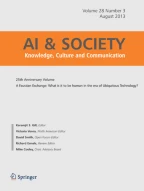Abstract
This paper is a discussion about how the Application Perspective works in practice.1 We talk about values and attitudes to system development and computer systems, and we illustrate how they have been carried out in practice by examples from the Florence project.2 The metaphors ‘utensil’ and ‘epaulet’ refer to questions about how we conceive the computer system we are to design in the system development process. Our experience is that, in the scientific community, technical challenges mean making computer systems that may be characterised as ‘epaulets’: they have technical, fancy features, but are not particularly useful. Making small, simple, but useful computer systems, more like ‘utensils’, does not give as much credit even if the development process may be just as challenging.
Explore related subjects
Discover the latest articles, news and stories from top researchers in related subjects.References
Bjerknes, Gro and Tone Bratteteig (1984). The Application Perspective — another way of conceiving system development and edp-based systems, in Sääksjärvi (ed.)Report of the Seventh Scandinavian Research Seminar on Systemeering. Helsinki.
Bjerknes, Gro and Tone Bratteteig (1987). Florence in Wonderland: System Development with Nurses, in Bjerknes, G. et al, (eds)Computers and Democracy: A Scandinavian Challenge. Avebury, Aldershot.
Cockburn, Cynthia (1983).Brothers: Male Dominance and Technical Change. Pluto Press, London.
Ehn, Pelle and Morten Kyng (1987). The Collective Resource Approach to Systems Design, in Bjerknes, G. et al, (eds)Computers and Democracy: A Scandinavian Challenge. Avebury, Aldershot.
The Florence Project (1987).Ä implementere en idé — samarbeid og konstruksjon i Florence-prosjektet (Norwegian text: To implement an idea — cooperation and construction in the Florence project). Florence Report No 3, Department of Informatics, University of Oslo.
Floyd, Christiane (1987). Outline of a Paradigm Change in Software Engineering, in Bjerknes, G. et al, (eds)Computers and Democracy: A Scandinavian Challenge. Avebury, Aldershot.
Floyd, Christiane et al. (1987).Scanorama x,Mensch und Technik (German text). Werkstattbericht Nr 30, Ministerium für Arbeit, Gesundheit und Soziales des Landes, Nordrhein-Westfalen.
Foged, Brita and Randi Markussen (1984).Det flexible køn (Danish text: The flexible sex). Tiderne Skifter, Copenhagen.
Freidson, Eliot (1970).Profession of Medicine. Harper and Row, New York.
Martinsen, Kari and Kari Wærness (1979).Pleie uten omsorg? (Norwegian text: Nursing without care?). Pax Forlag, Oslo.
(1982).Webster's New World Dictionary. Simon and Schuster, New York.
Wynn, Eleanor H. (1979).Office Conversation as an Information Medium. PhD Dissertation, Department of Anthropology, University of California, Berkeley.
Author information
Authors and Affiliations
Rights and permissions
About this article
Cite this article
Bjerknes, G., Bratteteig, T. Computers — Utensils or epaulets? The application perspective revisited. AI & Soc 2, 258–266 (1988). https://doi.org/10.1007/BF01908550
Issue Date:
DOI: https://doi.org/10.1007/BF01908550
